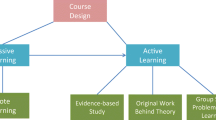Abstract
Research is an integral part of the curricula of both the pharmacy and medical degree programs at the University of Namibia (UNAM) School of Medicine (SOM). Early in their career students identify research projects and pursue them within the context of their degree program. At a fundamental level these projects expose students to the scientific method and encourage the development of analytical and interpretative tools that will be important in their professional lives. The inclusion of research as a subject significantly aligns the institutions’ research agenda with the health needs of the country. Research at UNAM SOM, within both the medicine and pharmacist degree programs, aims to nurture self-directed learning within an inter-professional milieu.
Similar content being viewed by others
References
Eichbaum Q, Nyarango P, Bowa K, Odonkor P, Ferrão J, Mashalla Y, Vainio O, Vermund SH. “Global networks, alliances and consortia” in global health education-the case for south-to south partnerships. J Acquir Immune Defic Syndr. 2012; 61(3):263–264.
Mullan F, Frehywot S, Omaswa F, Buch E, Chen C, Greysen SR, et al. Medical schools in sub-Saharan Africa. Lancet. 2011; 377(9771):1113–1121.
Greysen SR, Dovlo D, Olapade-Olaopa EO, Jacobs M, Sewankambo N, Mullan F. Medical education in sub-Saharan Africa: a literature review. Med Educ. 2011; 45(10):973–986.
Beattie P, Renshaw M, Davies C. Strengthening health research in the developing world: malaria research capacity in Africa [Internet] The Wellcome Trust; 1999 [cited 2 Feb 2006]. http://www.wellcome.ac.uk/assets/wtd003224.pdf.
Hofman K, Ryce A, Prudhomme W, Kotzin S. Reporting of non-communicable disease research in low- and middle-income countries: a pilot bibliometric analysis. J Med Libr Assoc. 2006; 94(4):415–420.
Sodjinou R, Agueh V, Fayomi B, Delisle H. Obesity and cardio-metabolic risk factors in urban adults of Benin: relationship with socioeconomic status, urbanisation, and lifestyle patterns. BMC Public Health. 2008; 4:8:84.
Medical professionalism in the new millennium: A physician charter. Ann of Intern Med. 2002; 136:243–246.
Blank L, Kimball H, McDonald W, Merino J. Medical professionalism in the new millennium: A physician charter 15 months later. Ann of Intern Med. 2003; 138:839–841.
Frishman, WH. Student research projects and theses: should they be a requirement for medical school graduation? Heart Dis. 2001; 3(3):140–144.
Zier, K, Coplit LD. Introducing INSPIRE, a scholarly component in undergraduate medical education. Mt Sinai J Med. 2009; 76(4):387–391.
Houlden, RL, Raja, JB, Collier, CP, Clark, AF, Waugh, JM. Medical student’s perceptions of an undergraduate research elective. Med Teach. 2004; 26(7):659–661.
Biggs J. Enhancing teaching through constructive alignment. High Educ. 1996; 32:347–364.
Gipps C. Socio-Cultural Aspects of Assessment. Rev Educ Res. 1999; 24:355–392.
Shepard LA: The role of assessment in a learning culture. Educ Res. 2000; 29(7):4–14.
Glew RH. Promoting collaborations between biomedical scholars in the US and sub-Saharan Africa. Exp Biol Med. 2008; 233(3):277–285.
Burdick WP, Morahan PS, Norcini JJ. Slowing the brain drain: FAIMER education programmemes. Med Teach. 2006; 28(7):631–634.
Willis M, Deardorff A. Developing a research-focused learning community at one medical school. Med Sci Edu. 2011;21(1S):98–103.
CichoskiKelly EM. Using Research as a tool for reinforcing basic sciences in the clinical years: Description of a fourth year teaching/research requirement at the University of Vermont College of Medicine. Med Sci Edu 2011;21(1S):59–62.
Neville AJ. Problem-based learning and medical education forty years on. A review of its effects on knowledge and clinical performance. Med Princ Pract. 2009;18:1–9.
Author information
Authors and Affiliations
Corresponding author
Rights and permissions
About this article
Cite this article
Jacobson, C., Hunter, C.J. & Wessels, Q. Biomedical Research at Namibia’s First School of Medicine and Pharmacy. Med.Sci.Educ. 23 (Suppl 1), 135–140 (2013). https://doi.org/10.1007/BF03341818
Published:
Issue Date:
DOI: https://doi.org/10.1007/BF03341818



